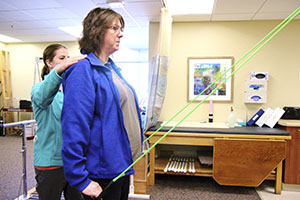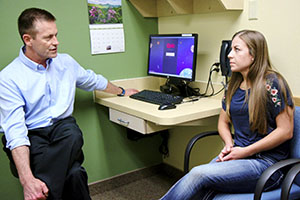By KIM VAN OOSTEN
Photos by CHRIS RYAN
LITTLE FALLS, Minn. — In 2014, more people came to the emergency room at CHI St. Gabriel's Health seeking opioids for pain management than for any other reason. By November of 2015, requests for narcotic pain relief had fallen out of the top 20 reasons for seeking emergency care at the critical access hospital.

Gary Sperl, pharmacy general manager for Coburn's Pharmacy in Little Falls, Minn., is a member of the Morrison County Prescription Drug Task Force. Led by CHI St. Gabriel's Health, the diverse coalition is making progress against opioid abuse in the rural community.
Likewise, between January of 2014 and November of 2017, Coborn's Pharmacy, one of three pharmacies in Little Falls proper, logged a 35 percent reduction in the number of opioid doses it dispensed per month. "That is very substantial — it's massive," said Gary Sperl, the store's pharmacy general manager. In total there are four pharmacies in Morrison County, and all have had similar downward trendlines in the sale of prescription opioids, he said.
That extraordinary result was achieved through a coordinated community response to prevent opioid abuse and treat opioid dependence disorder in Morrison County. The comprehensive approach this small community and rural county has developed to reduce opioid dependence demonstrates compassion to both patients struggling with chronic pain and to those who have an opioid use disorder. It reinforces law enforcement efforts to choke off the illegal sale of opioids. It drives accountability, cooperation and transparency from patients, doctors and pharmacists. Most importantly, it reduces suffering and saves lives.
For achieving that lifesaving balance and doing so in a way that can be efficiently scaled and readily replicated in other communities, the Morrison County Opioid Program led by CHI St. Gabriel's Health is the 2018 recipient of CHA's Achievement Citation.
Kathleen Lange, foundation director at CHI St. Gabriel's Health and head of the Morrison County Prescription Drug Task Force, sums up the program this way: "We're reducing the prescribing of opioids; we are educating the community and other health care organizations around the nation (about the risks of prescription narcotics and reduction of harm strategies), and we are developing a different approach to pain management."
'The pills have to go'
To get started, CHI St. Gabriel's Health reactivated the Morrison County Prescription Drug Abuse Task Force, bringing together representatives of law enforcement, the county's public health department, social services providers, pharmacies and the school district to plot. a multi-pronged initiative.

To reduce the prescribing of opioids, clinicians with in CHI St. Gabriel's Health Family Medical Center in Little Falls may recommend that patients with chronic pain try physical therapy, massage therapy, exercise or pain-blocking injections.
The plan the task force developed has three main components: changing the approach to pain management at St. Gabriel's Health's family practice clinics to emphasize alternatives to narcotics, working with police to reduce street access to prescription narcotics that for many have been a gateway to heroin addiction, and preventing new addictions and criminal acts by educating clinicians and the community about the dangers of opioids.
Dr. Kurt DeVine and Dr. Heather Bell lead the hospital's cross-disciplined controlled substance care team. Both are family practitioners with CHI St. Gabriel's Health Family Medical Center, and they are tasked with the overarching goal of reducing the prescribing of opioids for chronic pain within the family practice setting.
The doctors influence their colleagues to consider alternatives to opioids in first-line treatment of pain. Depending on the patient, options may include physical therapy, exercise, visits to a pain clinic for injections of pain-blocking drugs, or massage therapy. By limiting new opioid prescriptions and follow-on prescription, the clinic is reducing the risk that new patients will develop opioid dependencies or stockpile drugs for resale to street dealers.
DeVine said, "Until we do the hard work and we get the pills off the street that are coming out of clinics all over this country, I don't think we're going to make a real difference in what happens five years down the road. The pills have to go."
DeVine and Bell are joined on the controlled substance care team at CHI St. Gabriel's Health by a nurse navigator, a social worker, pharmacist and a mental health counselor. Lange said team members closely monitor all patients using opioids with the goal of shifting them to alternatives to narcotics for pain control.
Patients taking opioids long term must agree to get them only from one prescriber. They must take urine tests to prove they are consuming the drugs as directed and not reselling them.
In its first two years of operation, the team was involved in the oversight of 1,500 patients, some of whom also were taking benzodiazepines along with opioids, a combination that puts individuals at higher risk of addiction. Seven hundred of those patients had their prescriptions reduced and 329 were completely tapered off opioids, stimulants and benzodiazepines, according to CHI St. Gabriel's Health.
All hands on deck
In the Morrison County initiative, leaders get out of their silos and work together on solutions. One result of the community collaboration is that inmates in the county jail can now continue to take the craving suppressant Suboxone to stay on course with their treatment during incarceration, an approach supported by addiction specialists. And Bell said that rather than automatically incarcerating individuals caught abusing drugs, law enforcement officials may reach out to CHI St. Gabriel's Health to get medical help.
The vigilance of community pharmacists has been critical to curbing the street supply of illegal prescription medicines. Pharmacists have access to a database that may help them surmise a patient may be abusing or reselling prescription drugs. Sperl, a task force member, said, "Part of my role now is to hold my fellow pharmacists in the community accountable" to raise the warning when there is reason to suspect overprescribing or misappropriation of the drugs. He said all six pharmacists at Coburn's work to support the goals of the drug task force.
Because of the high potential for abuse, opioids are Schedule II drugs; as such, they cannot be automatically refilled. A new prescription is needed. Sperl said that, with input from the task force, physicians at CHI St. Gabriel's clinic implemented a rule that a prescription must last for 30 days.
"The insurance company says (a new opioid prescription) can go through at 23 days, and that's what had happened for years, people would get it filled early, and early, and early, and pretty soon after about three, four fills, they had an extra fill in their pocket and that's where a lot of it went on the street," he said.
Replicating the approach
Jason McDonald, an investigator in the Morrison County Sheriff's Office, said that since the task force began its work undercover law enforcement officers have seen a decrease in the number of prescription opioids they're able to purchase in drug stings.

Dr. Kurt DeVine meets with Monica Rudolph, a patient who is in recovery from opioid use disorder. DeVine, a family practice physician with CHI St. Gabriel's Health Family Medical Center, co-leads a team tasked with reducing the prescribing of opioids for chronic pain within the family practice setting.
Lange said that education events at schools, nursing homes and in the community are building awareness of the epidemic and the citizens' responsibility in keeping unused pills off the street. Patients are encouraged to safeguard their prescription pain killers and take unused pills to a drug take-back site for safe disposal.
Other Minnesota communities are adopting the approach used in the Morrison County Opioid Program. Last July, the state legislature granted $1 million for a pilot program to fund the model's expansion in various Minnesota communities.
Monica Rudolph, 25, a patient with opioid use disorder achieved sobriety with the support of the program. She said everyone who struggles with narcotic dependence should be able to get help from people who care about them as individuals — people who don't judge them as unworthy on the basis of addiction.
Copyright © 2018 by the Catholic Health Association
of the United States
For reprint permission, contact Betty Crosby or call (314) 253-3490.